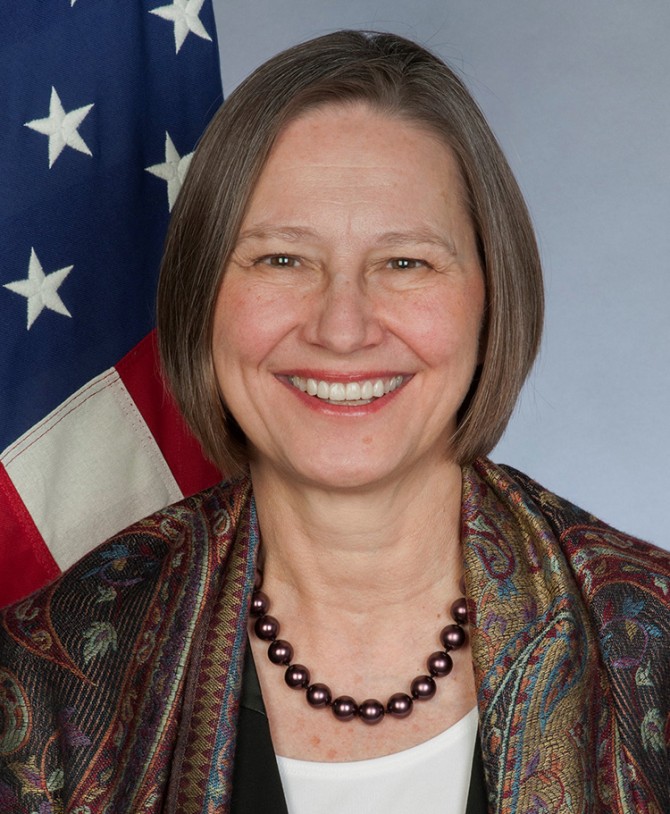Local and global efforts keep climate change fight alive
By David Nutt
President Donald Trump’s decision last June to withdraw the United States from the Paris climate accord left many Americans discouraged about the prospect of combating climate change. But despite warming temperatures, extreme weather events and political inaction, there is hope on the horizon, according to Jennifer Haverkamp, who served as the Obama administration’s ambassador and special representative for environment and water resources in the U.S. Department of State from 2016 to 2017.
“In response to the president’s announcement, states, cities, corporations and many other sectors have risen to the challenge and are working to signal to the rest of the world that there is still an active commitment in the U.S. to reducing our greenhouse gas emissions and making progress towards a low-carbon economy,” said Haverkamp, who this semester is executive in residence at Cornell’s Atkinson Center for a Sustainable Future.
As executive in residence, she is working with Atkinson leadership on strategic planning around policy engagement. She is also a visiting professor of the practice and distinguished practitioner in residence at Cornell Law School, teaching the course Current Developments in International Environmental Law.
As ambassador, Haverkamp helped lead U.S. negotiations of an amendment to the Montreal Protocol on Substances that Deplete the Ozone Layer, an international agreement intended to phase down the global use of hydrofluorocarbons; reducing this potent greenhouse gas could avoid global warming of up to half a degree Celsius this century. She also led the U.S. team in negotiating an agreement by the International Civil Aviation Organization to adopt the first-ever global market-based measure to help enable carbon-neutral growth for international aviation.
“Both of those are also important fora for making progress on climate change, and with strong business support they are not in the crosshairs the way the Paris agreement was,” Haverkamp said. “And in contrast to the climate denialism you see in American politics, going to these international negotiations brings home how widely accepted the urgency of the problem is, and the need to address it.”
Haverkamp will further explore this topic in a lecture, “Filling the Vacuum: Global Climate Prospects Following U.S. Withdrawal from the Paris Agreement,” Monday, Feb. 26, at 2:55 p.m. in 125 Riley-Robb Hall. The lecture is part of the 2018 Cornell University Climate Change Seminar, sponsored by the Atkinson Center, the Cornell Institute for Climate Smart Solutions, and the Department of Biological and Environmental Engineering.
“We are thrilled to have Ambassador Haverkamp with us for the semester,” said David Lodge, the Francis J. DiSalvo Director of the Atkinson Center. “Bringing experts to campus who have experience in government, civil society or business helps Cornell faculty and students better understand the research topics and activities that are most likely to influence practices and policies outside the ivory tower.”
Haverkamp has worked for government agencies and organizations that address global environmental policy and international trade, including the Environmental Protection Agency, the U.S. Department of Justice, Environmental Defense Fund and the Executive Office of the President, where she served as assistant U.S. trade representative for environment and natural resources. She has also taught at George Washington Law School and Johns Hopkins University. This variety of experience has given her insight into how policy is shaped, as well as the many obstacles that can make international consensus difficult to achieve.
“Significant multilateral agreements don’t happen until most, or all, of the participants believe reaching agreement is in their national interest. After that, it’s working out the details, which can still be very challenging,” Haverkamp said. “But you get nowhere until there’s broad support for reaching a deal. There are just too many ways to procedurally gum up the works along the way.”
During her time on campus, Haverkamp is reaching out to faculty across the university to explore opportunities to connect their sustainability-related research with policymakers, as part of her work for the Atkinson Center. And she’s engaging with students, particularly those who are interested in an environmental career but may not have considered working in the policy realm.
“I think climate change is the defining threat for this generation. It is such a crosscutting problem, it’s not going to be solved by one big idea or one magic bullet,” Haverkamp said. “There are so many ways you can contribute in the policy space. You don’t have to go out and do it at the U.N. You can do it in your community, on your campus, and make a difference.”
David Nutt is managing editor at the Atkinson Center for a Sustainable Future.
Media Contact
Get Cornell news delivered right to your inbox.
Subscribe